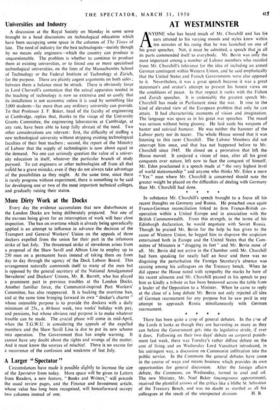A NYONE who has heard much of Mr. Churchill and has
his ears attuned to his varying moods and styles knew within ten minutes of his rising that he was launched on one of his great speeches. Not, it must be admitted, a speech that in all its parts commended itself to everybody. Mr. Bevin was only the most important among a number of Labour members who recoiled from Mr. Churchill's tolerance for the idea of including an armed German contingent within Western Union, and he said emphatically that the United States.and French Governments were. also opposed to it. Nevertheless, it was a great speech because it was a great statesman's and orator's attempt to present his honest views on the conditions of peace. In that respect it ranks with the Fulton and Zurich speeches. It is undeniably the greatest speech Mr. Churchill has made in Parliament since the war. It rose to the kind of elevated view of the European problem that only he can attain. It had characteristic moments of vision and imagination. The language was spare as in his great .war speeches. The mood• was serious without being gloomy. He laid aside his weapons of banter and satirical humour. He was neither the hammer of the Labour party nor its teazer. The whole House sensed that it was listening to this rarer Churchill. The Labour Members did not interrupt him once, and that has not happened before to Mr. Churchill since 1945. He closed on a peroration that left the House moved. It conjured a vision of man, after all his great conquests over nature, left now to face the conquest of himself. Mr. Eden proclaimed it a speech made at " the very highest level of world statesmanship" and anyone who thinks Mr. Eden a mere " Yes " man where Mr. Churchill is concerned should note the greater weight he placed on the difficulties of dealing with Germany than Mr. Churchill had done.
* * * *
In substance Mr. Churchill's speech brought to a focus all his recent thoughts on Germany and Russia. He preached once again Franco-German reconciliation linked .1•21 firm Franco-British co- operation within a United Europe and in association with the British Commonwealth. From this strength, in the terms of his Edinburgh declaration, he would negotiate with Soviet Russia. Though he praised Mr. Bevin for the help he has given to the cause of Western Union, he begged him to disprove the suspicion entertained both in Europe and the United States that the Com- mittee of Ministers is " dragging its feet " and Mr. Bevin most of all. Mr. Bevin did not arrive in the Chamber until Mr. Churchill- had been speaking for nearly half an hour and there was no disguising the perturbation the Foreign Secretary's absence was causing among his colleagues on the Treasury bench. When he did appear the House noted with sympathy the marks he bore of his recent ailments and Mr. Churchill paused in his speech to pay him as kindly a tribute as has been bestowed across the table from a leader of the' Opposition to a Minister. When he came to reply at the close of a long debate Mr. Bevin not only rejected all idea of German rearmament for any purpose but he saw peril in any attempt to approach Russia simultaneously with German
rearmament. * * * *
There has been quite a crop of general debates. In the else of the Lords it looks as though they are harvesting as many as they can before the Government gets into its legislative stride, if ever it does. Following on their two days' debate on corporal punish- ment last week, there was Tuesday's rather diffuse debate on the cost of living. and on Wednesday Lord Vansittart introduced, in his astringent way, a discussion on Communist infiltration into the public service. In the Commons the general debates have come in the course of ways .and means business which provides its own
opportunities for general discussion. After the foreign affairs debate, the Commons, on Wednesday, turned to coal and oil. The new Minister, Mr. Noel Baker (incongruous appointment), received the plentiful arrows of the critics like a blithe St. Sebastian of the Treasury Bench, and was no doubt as startled as all his colleagues at the result ,of the unexpected division. H. B.






































 Previous page
Previous page